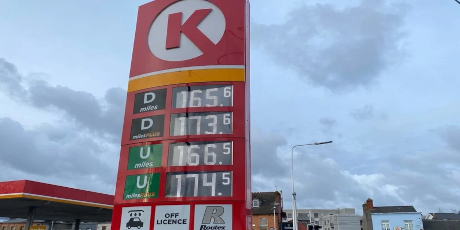Are Irish petrol prices ever going to come down again? 28 Feb 2024

Analysis: we pay a global price for fuel so geopolitical events mean we are not seeing any major drop in fuel prices at the pumps - Dr. Paul Deane, Senior Research Fellow, MaREI Centre/ERI
It is difficult to appreciate how a narrow stretch of water 20 miles wide and thousands of kilometres away can impact how much we pay to fuel our cars in Ireland. The Bab el-Mandeb Strait in the Red Sea is situated between Djibouti and Yemen and an important corridor for the global oil trade with an estimated six million barrels of oil flowing through the Strait toward Europe, the United States, and Asia each day. In recent months, Iran-backed Huthi rebels, who control much of war-torn Yemen, have been targeting shipping in the strait in a campaign they say is in solidarity with Palestinians in the Israel-Hamas war
In energy markets, geopolitical events such as these ripple around the world as price spikes. Ireland is a country that uses so much energy and produces so little and is deeply exposed to these events. The cost we pay to fill our cars with petrol and diesel in Ireland is influenced by the international price of oil, but several other overlapping factors are important also. The availability of refining capacity to turn that oil into petrol and diesel, sentiment about the global outlook and how much product is already in stock can combine to reinforce a price increase or mitigate it.
While the world's producers today are more resilient to these types of geopolitical events (more diverse production is available, particularly from the US), the impact is still important. The recent escalation of events in the Middle East has caused jitters again in oil markets and is putting upward pressure on prices.
Ireland does not import any oil directly from the Middle East — we mainly rely on the UK, other EU countries and, to a lesser extent, the US. We pay a global price, and this is why these events impact us and that is why we are not seeing any major drop in fuel prices.
The complete closure of the Strait is unlikely, but most events are considered unlikely until they happen. Any disruptions to shipments through the strait, though, will impact oil prices and leave importers rushing to find alternatives sources of supply. This would impact Ireland as most other countries.
Ireland is one of the most fossil fuel reliant economies in Europe with fossil fuel meeting 85% of energy needs, this includes oil, coal, and gas. But Ireland is 100% reliant on imported oil meeting half of our energy needs.
Oil is used mainly to keep our cars moving, fuel our planes and trucks and keep over 700,000 of our homes warm. Without oil, our economy would grind to a halt, and implementing technology alternatives to oil such as electric vehicles and electric heating are important but will take time and investment.
In the case of a major physical interruption of oil in Europe, Ireland has a strategic reserve of 90 days of oil which would shield us from some disruption, but prices would be very high. The exploitation of possible indigenous oil resources off the coast of Ireland could be beneficial if a prolonged disruption of more than three months occurred, but this would not reduce the market prices we pay at the pumps.
The cheapest type of energy is energy we don’t use. Changing behaviour patterns and using our cars less is one powerful complementary lever to reduce Ireland’s oil needs. We use our cars a staggering amount in Ireland. Last year, we drove over 30 billion kilometres — a distance from planet Earth to the edge of interstellar space and back again in just 12 months. Twice as many children now get dropped to primary school gates by car than walk to school, a complete reverse of the situation 30 years ago where most children walked to school.
Using our cars less is good for energy security: we would import less oil and be less exposed to geopolitical events. But it is also good for the environment - we would pollute less - and it’s also good for our health as we would be more physically active.
But behaviour change is never easy. We all want action on environmental problems but few of us want inconvenience. This is a huge challenge, and we tend to focus on technology solutions because they allow us to continue our current lifestyles with as little disruption as possible. But, given the scale of our energy use, technology solutions alone can only go so far.
We have little control over how international events impact energy, but we have some power over how much energy we choose to use.
Enhancing energy security is often associated with building infrastructure such as pipelines and storage to protect energy supply. But infrastructure to reduce oil demand such as bus corridors, light rail, cycle lanes, and shared mobility alternatives must also be considered.
The history of energy policy in Ireland has been predominantly one shaped by reacting to international events that occur far from our borders such as energy crises. We have little control over how these events impact our energy supply and prices, but we have some power over how much energy we choose to use. Waiting for the next crisis is a poor strategy. Reducing energy use will insulate us from these events.